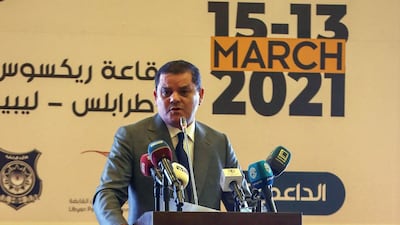Libya's unity government led by interim prime minister Abdul Hamid Dbeibah was sworn in on Monday in the eastern city of Tobruk to lead the country to elections in December after years of conflict and division.
"I swear by God almighty to perform my duties with honesty and sincerity," said Mr Dbeibah, said taking the oath of office in front of members of parliament in the eastern city of Tobruk.
His government will replace the Government of National Accord (GNA), which controlled Tripoli and north-west Libya, and a rival government in the east.
The audience included diplomats from western countries, as well as Turkey, which had backed the GNA, and Egypt, which had supported the eastern-based administration.
Libya descended into conflict after dictator Muammar Qaddafi was toppled and killed in a Nato-backed uprising in 2011, resulting in several forces vying for power. A UN-supervised process is aimed at uniting the country, building on an October ceasefire between the rival administrations.
Mr Dbeibah was selected at UN-sponsored talks in February alongside an interim three-member presidency council, which was also sworn in on Monday.
The ceremony comes after parliament last week approved Mr Dbeibah's Cabinet, in a move hailed by key leaders and foreign powers as historic.
His government includes two deputy prime ministers, 26 ministers and six ministers of state, with the key foreign affairs and justice portfolios handed to women, a first in Libya.
"This will be the government of all Libyans," Mr Dbeibah said after the vote. "Libya is one and united."
Outgoing GNA head Fayez Al Sarraj has said he is "fully ready to hand over" power, while the leader of the Libyan National Army allied to the eastern administration, Field Marshal Khalifa Haftar, last month offered "the support of the armed forces for the peace process".
But the new executive faces daunting challenges to unify the country's institutions, end a decade of fighting marked by international interference and prepare for elections on December 24.
The European Union last week issued a warning it could impose sanctions on domestic or foreign "spoilers" who undermine peace efforts.
Mr Dbeibah was considered an outsider compared with other candidates vying for the job, and his election process has been marred by allegations of vote-buying.
But he jumped into his role even before his inauguration, including pledging to combat the coronavirus crisis, and taking anti-corruption measures by freezing state-owned investment funds.
But after 42 years of dictatorship under Qaddafi and a decade of violence, the list of challenges is long.
The country of seven million that sits on top of Africa's largest proven crude oil reserves, is mired in a dire economic crisis, with soaring unemployment, crippling inflation and endemic corruption.
Libya also suffers from poor public services including regular power cuts and water shortages.
Another key task will be ensuring the departure of an estimated 20,000 mercenaries and foreign fighters still living in the country, who Mr Dbeibah has called "a stab in our back".
The UN Security Council on Friday called for all foreign forces to leave "without further delay".

